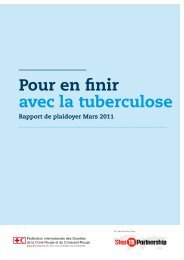Thailand - Stop TB Partnership
Thailand - Stop TB Partnership
Thailand - Stop TB Partnership
Create successful ePaper yourself
Turn your PDF publications into a flip-book with our unique Google optimized e-Paper software.
The Public Health Watch <strong>TB</strong> Monitoring Project partners with civil society<br />
researchers in Bangladesh, Brazil, Nigeria, Tanzania, and <strong>Thailand</strong>, all of which<br />
are WHO-designated <strong>TB</strong> high-burden countries, to monitor and advocate for<br />
improved governmental policies and services to control <strong>TB</strong>. The five reports<br />
that have resulted from their monitoring efforts reveal a number of overarching<br />
themes regarding <strong>TB</strong> and <strong>TB</strong>/HIV.<br />
Researchers all found low levels of awareness of the basic facts about<br />
<strong>TB</strong> and <strong>TB</strong>/HIV coinfection among political officials and the general population,<br />
including within high-risk groups such as people living with HIV/AIDS.<br />
Widespread ignorance of how <strong>TB</strong> is spread and the fact that the disease can be<br />
cured contribute to high levels of stigma and discrimination against people living<br />
with <strong>TB</strong>. Media coverage of <strong>TB</strong> is limited, and national <strong>TB</strong> programs (NTPs)<br />
generally lack strong communications strategies and staff with the experience<br />
and skills to interact effectively with the press.<br />
Reports from all five countries highlight a number of other issues as well.<br />
First, inadequate attention to the linkages between <strong>TB</strong> and poverty has<br />
resulted in a paucity of government measures to address the hidden costs of<br />
treatment that burden the poor and other vulnerable groups, including women.<br />
Second, the fact that <strong>TB</strong> patients often rely on private service providers<br />
leads to inequitable access to quality services, constrains government capacity<br />
to monitor the course of the epidemic, and raises concerns about the potential<br />
of increasing resistance to first-line <strong>TB</strong> drugs.<br />
Third, context-specific approaches to <strong>TB</strong> control that integrate community<br />
participation are showing positive results but require additional support<br />
and funding from domestic and international sources.<br />
Finally, Public Health Watch research suggests that in the absence of<br />
public awareness and engagement around <strong>TB</strong> and <strong>TB</strong>/HIV, political and financial<br />
accountability for <strong>TB</strong> control efforts falters. At present, there are few structured<br />
mechanisms to encourage broad public participation in the design, implementation,<br />
and evaluation of <strong>TB</strong> policy at the domestic or international level.<br />
In addition to the common themes and findings outlined in this overview,<br />
country-specific recommendations can be found at the end of each<br />
national report. 1<br />
PUBLIC HEALTH WATCH MONITORING REPORTS 13



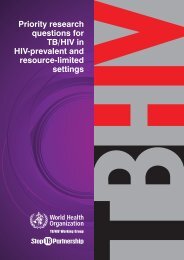
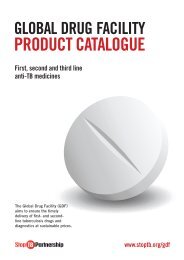
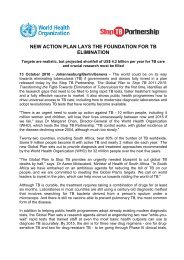
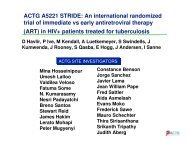
![Global Drug Facility Annual Report 2011 [.pdf] - Stop TB Partnership](https://img.yumpu.com/26788745/1/184x260/global-drug-facility-annual-report-2011-pdf-stop-tb-partnership.jpg?quality=85)

![Concept note on national stop TB partnership [.pdf]](https://img.yumpu.com/26788741/1/184x260/concept-note-on-national-stop-tb-partnership-pdf.jpg?quality=85)

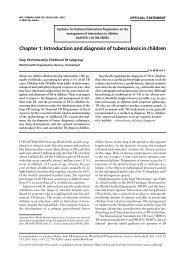
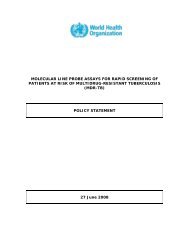
![2005 and Challenges for 2006 - 2015 [.pdf] - Stop TB Partnership](https://img.yumpu.com/26788674/1/190x245/2005-and-challenges-for-2006-2015-pdf-stop-tb-partnership.jpg?quality=85)
![Brochure (French) [.pdf] - Stop TB Partnership](https://img.yumpu.com/17234792/1/190x91/brochure-french-pdf-stop-tb-partnership.jpg?quality=85)

